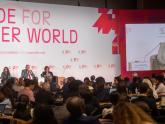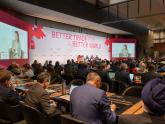As part of her official visit to Switzerland and Austria, Foreign Minister Diana Mondino participated this afternoon in the High-Level Panel (Sowing inclusivity: rethinking agricultural trade for all) of the Public Forum 2024, an event held at the WTO headquarters in Geneva that every year brings together hundreds of experts from around the world to assess the situation of the multilateral trading system. There, she stressed that Argentina “fully supports free and fair agricultural trade, within the framework of an open, stable and rules-based system.” Mondino also met with WTO Deputy Director-General Angela Ellard.
“Argentina values each opportunity to join in the efforts to overcome the stagnation we have been facing for the past 30 years regarding agricultural negotiations within the WTO, such as the decision to eliminate export subsidies in 2015,” she added.
The Foreign Minister also explained that “the agricultural sector remains very distorted. Tariffs on agricultural products are twice as high as those imposed on industrial goods and non-tariff measures unreasonably affect agricultural trade. These subsidies cause inefficiency and pose an obstacle to the efforts to ensure food security.”
Before the Ministers and high-level authorities, Mondino stated: “We call for free trade because we are confident that it will help mitigate food surpluses and deficits around the world. Selling agricultural products below the cost of production at international markets and restricting access to non-subsidized producers hamper the agricultural activity and the economic growth of low-income countries.”
Regarding Argentina's agricultural capabilities, the Foreign Minister stated that our country is a leader in the implementation of technological solutions for precision farming, including agro-climatic indicators, crop and soil monitoring, direct sowing, intelligence systems in environmental management and simulation of agricultural production processes.”
“Argentina believes that agriculture can contribute to food safety and climate change through efficient and sustainable productive systems that can produce more with less resources. These tools are not only useful for increasing the production of healthier and better-quality food, but they also play a crucial role in reducing greenhouse gas emissions,” she explained.
The Foreign Minister was clear when stating that “unfortunately, too many countries are comfortable with the status quo, while others still suffer the negative effects of trade-distorting measures. Now, it is our responsibility to work towards the solution of the problems we have been facing for the past 30 years.”
In addition, Mondino stressed that “in order to achieve this goal, we need to resume negotiations based on a holistic approach and seek to make progress on all issues on the table. We must abandon the mini-package approach, as it will only lead us to another comfort zone, resulting in stagnation. This does not entail refusing to address topics that are of great importance for many countries suffering the consequences of food insecurity. We must not lose sight of the fact that the solution can only be achieved through a broader, more comprehensive and ambitious package approach, with trade liberalization and the removal of distortions at its core.”
“With these goals in mind, we need to resume negotiations on agriculture within the WTO and take a leading role. Another Ministerial Conference without concrete results regarding agriculture will not be acceptable,” she concluded.
The Argentine Foreign Minister shared the panel with former European Commissioner for Trade, Cecilia Malmström; FAO Deputy Director-General, Beth Bechdol; Council on Foreign Relations (CFR) researcher, Inu Manak; and World Farmers’ Organization Secretary-General, Andrea Porro.
At the end of the day, the Foreign Minister held a meeting with WTO Deputy Director-General, Angela Ellard, with whom she discussed issues related to trade facilitation, investments, harmful subsidies on fisheries and the settlement of trade disputes. In addition, they highlighted the importance of creating trade opportunities, especially in terms of goods and services, and reducing barriers and tariffs.











